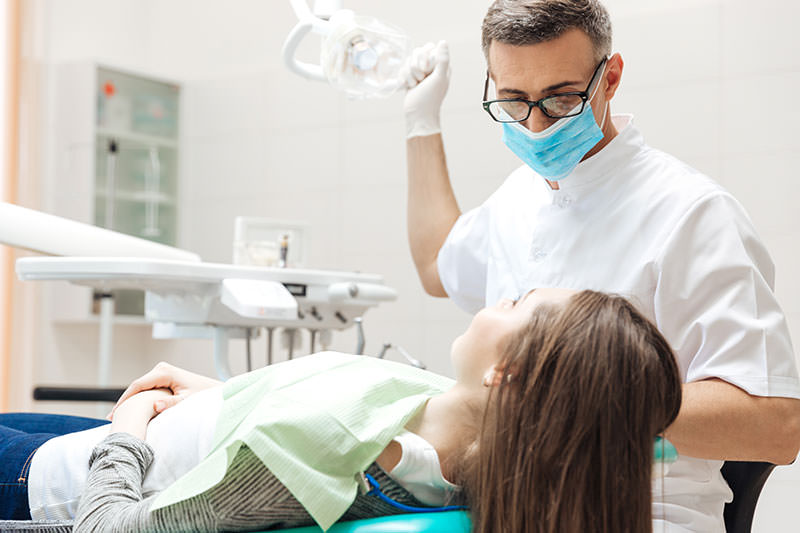
Wisdom Teeth Removal Recovery Tips
Wisdom tooth removal is one of the most common outpatient procedures done by an oral surgeon.
Talking with your oral surgeon about the surgery is important, but so is understanding the recovery process after wisdom teeth removal.
In fact, wisdom teeth extraction aftercare is a vital step to helping your mouth heal, alleviating pain, and fighting off infection. Check out this list of tips and tricks to help you recover from wisdom teeth removal as quickly as possible.
Wisdom Teeth Healing Process
Properly caring for your mouth after wisdom tooth surgery requires an understanding of how your body heals.
Post wisdom teeth removal, there is a hole left where each of the teeth originally sat. This hole begins to heal by creating a blood clot, which stops the bleeding and allows your body’s cells to repair the wisdom tooth surgical site.
Over the course of about two weeks, your body replaces the cells lost and forms a protective barrier over the wisdom tooth site. The wisdom teeth healing process is a relatively quick one, but you’ll need to do your part to ensure your mouth heals as quickly as possible.
Patients often ask, “How can I make the wisdom tooth healing process faster?”
In short: you can’t.
However, what you can do is appropriately take care of the wound to ensure your body has the means to heal from wisdom tooth surgery as quickly as possible.
Steps to Take After Wisdom Tooth Surgery
The most crucial aspect to a speedy wisdom tooth recovery is taking care of the surgical wound immediately after the wisdom tooth procedure. The next two days are all about keeping the area clean, avoiding additional damage, and allowing a blood clot to form.
For the first 48 hours post wisdom tooth procedure, it is vital that you clean the area and avoid anything that could become stuck inside the hole. Patients are encouraged to eat a soft-foods diet consisting of food like applesauce, smoothies, and pudding.
Avoid tobacco products and drinking through a straw. These can cause a dry socket, which is the worst complication possible during wisdom teeth recovery. Any patient who has had one will tell you that it hurts worse than the initial after-surgery pain.
Rinsing your mouth with warm saltwater ensures the wisdom tooth area is clean and free from any food you may have eaten. After day one, an antiseptic mouthwash will help fight off bacteria that could lead to an infection. You can also gently brush around the hole to help keep it clean.
During the first few days following wisdom teeth surgery, you should also keep the surgical area protected. Keeping a gauze pad over the hole will help prevent debris from entering and make the initial bleeding more manageable.
Get Your Rest After Surgery
If you want to speed up your wisdom teeth extraction recovery, get as much rest as possible. That means during the day as well as at night. Avoiding exercise immediately following the surgery is highly advised, giving your body the time it needs to focus on healing the wound.
Nighttime is more difficult for individuals. With an increase in how obvious the pain is, how do you sleep after wisdom teeth removal? The trick is to take your pain medication, rinse with warm salt water, and elevate your head.
Focusing on Food
A liquid or soft diet is a necessity during wisdom teeth healing. You should avoid dehydration by drinking water often, avoid drinking through a straw, and eat soft foods for at least the first week after your surgery.
You can transition to your regular diet by incorporating easy-to-chew foods like eggs or oatmeal, then slowly adding in tougher foods like pasta. Keep your chewing to a minimum for as long as possible to help speed up wisdom tooth surgery recovery.
Reducing Swelling and Bruising
Swelling and bruising are inevitable side effects after having your wisdom teeth removed. Plucking those teeth out of your jaw isn’t easy. It requires incisions, pressure, and often leaves your face feeling sore. This is natural and takes time to go down.
Swelling begins to go down after day three, while bruising tends to disappear in-between the first and second weeks. You can speed up the process by applying ice packs to your jaw. This helps fight inflammation and may reduce the pain you feel after wisdom tooth surgery.
What Not to Do After Surgery
Now that you know what to do, what can’t you do following the removal of your wisdom teeth?
There are plenty of situations you want to avoid during wisdom tooth recovery – starting with straws, alcohol, and tobacco.
Any form of tobacco, from chew to cigars, can lead to a dry socket. The same goes for a straw and any alcohol consumption. Avoiding these will keep your wisdom teeth wound lubricated, helping to prevent a painful dry socket and infection.
Eating chewy or tough foods is also problematic. Hard foods could damage newly forming tissue, while chewy foods made become stuck in the wisdom teeth wound and prevent healing. Both can also cause bacterial infections if they become stuck for too long.
Failure to clean the wisdom teeth wound is something most people struggle with. Around the one-month mark after surgery, patients often contract infections from poor oral hygiene habits. If you don’t regularly use a mouthwash as part of your routine, now is the time to incorporate one.
While you can eventually brush over the area where your wisdom teeth used to be, antiseptic mouthwash kills bacteria that regular brushing might otherwise miss. This practice is excellent for cleaning the wound after surgery and a general practice that leads to lifelong dental health.
The Do’s and Don’ts
All of this information can be a lot to remember, which is why most dentists give out a pamphlet explaining what you should do after the surgery. To make things simple, here are the Do’s and Don’ts after wisdom tooth extraction.
Wisdom Teeth Recovery Do’s
- Replace gauze every hour on the first day
- Rinse with warm saltwater regularly
- Rinse with an antiseptic mouthwash at least twice a day
- Eat soft and liquid foods
- Open and stretch your jaw from time to time
- Get plenty of rest
- Place ice packs on your jaw
- Continue to practice good oral hygiene
- Take your pain meds as needed
Wisdom Teeth Recovery Don’ts
- Drink alcohol or use tobacco
- Drink through a straw
- Touch or pick at the wound
- Eat tough or chewy foods
- Overexert yourself following the surgery
Making the Most of Your Recovery
Dealing with the after-effects of the wisdom tooth operation can be difficult but following these wisdom teeth, removal recovery tips can help make your pain more manageable and avoid any further complications. Caring for your mouth after wisdom teeth surgery isn’t difficult, it’s just a new regimen you’ll have to get used to.
Remember that, although minor, having your wisdom teeth extracted is a surgery and you should treat it like any other procedure. Proper care and cleaning are the only ways to prevent both dry sockets and infections. Talk with your dentist about these tips and what you can do to speed up the recovery process.
Keep in mind that everyone’s recovery process is different, too. While these tips will help you experience a healthy and fast wisdom tooth recovery, the time it takes your body to heal may be longer than others. For most patients following these tips, a full recovery happens between two and four weeks.


